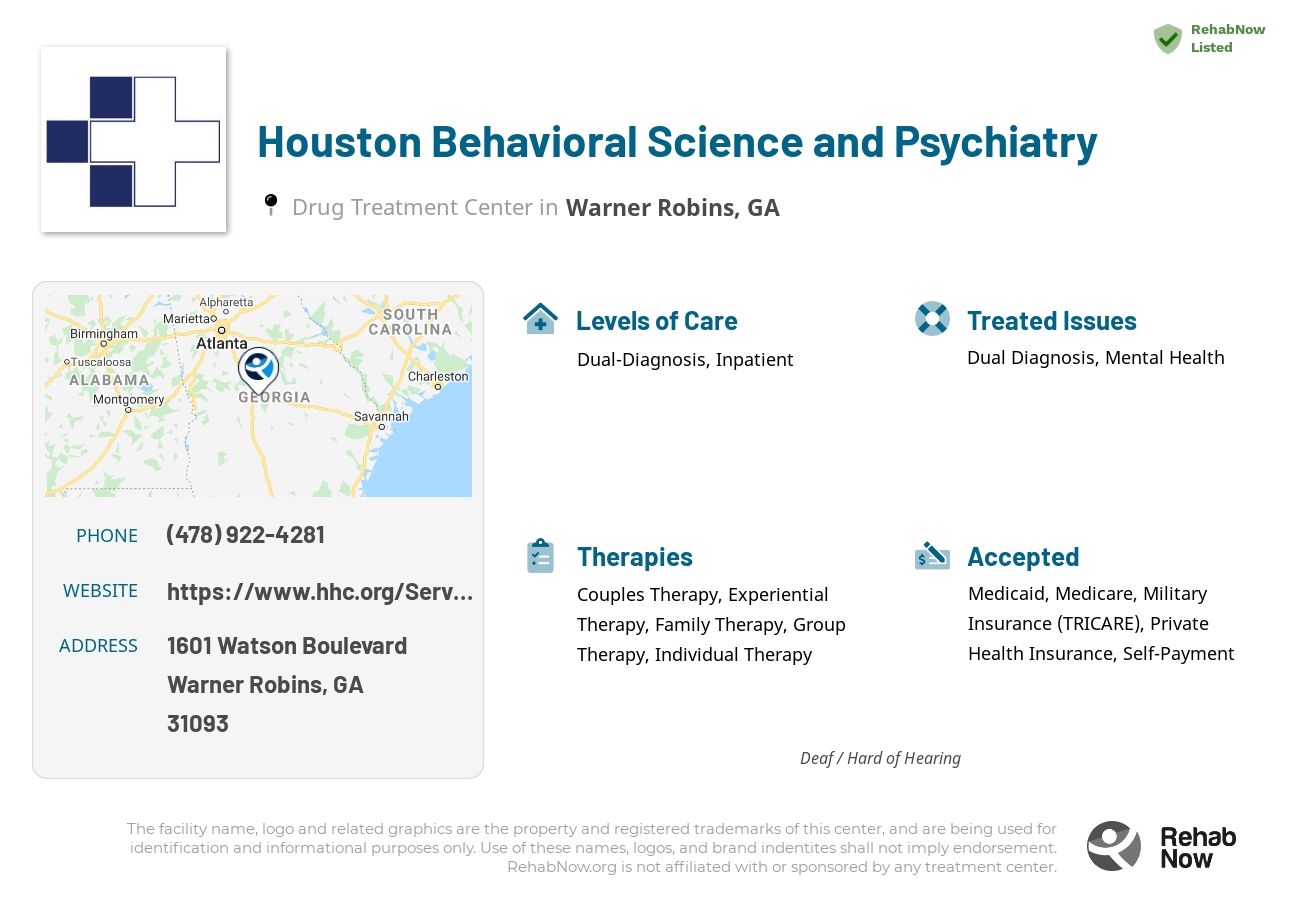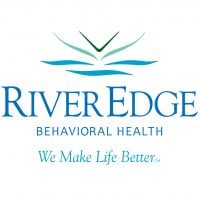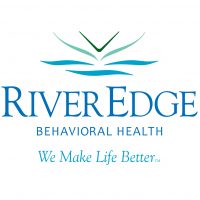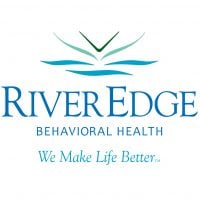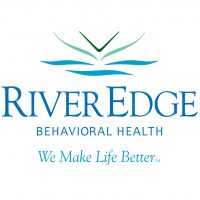
Houston Behavioral Science and Psychiatry
Drug Rehab Center in Warner Robins, Georgia
- Mental Health
- Dual Diagnosis
Houston Behavioral Science and Psychiatry offers specialized care for emotional, mental, and addiction issues led by experienced psychiatrist Dr. Alford Love and a multidisciplinary team of professionals, who provide one-on-one counseling, group therapy, and pharmacological interventions for a comprehensive plan of care to best address each patient’s particular needs.
About This Georgia Facility
Houston Behavioral Science and Psychiatry is a mental health facility offering specialized care for a variety of emotional, mental, and addiction issues. Led by experienced psychiatrist and certified addiction specialist Dr. Alford Love, Houston Behavioral Science and Psychiatry is a dedicated team of professionals that strive to provide supportive and individualized services. Offering a multidisciplinary approach, the team consists of psychiatrists, therapists, and additional addiction counselors, who all work together to provide a comprehensive plan of care to best address each patient’s particular needs.
Houston Behavioral Science and Psychiatry offers an array of services to those suffering from addiction and substance abuse issues. From one-on-one counseling to group therapy, the team works to address the underlying issues and determinants of addiction. This includes providing guidance on how to develop skills, work on practical strategies of dealing with stress, and create and problem-solve goals related to addiction. Additionally, Houston Behavioral Science and Psychiatry offers pharmacological interventions for those who may need medication to manage cravings, withdrawal symptoms, and other associated potential dangers.
Houston Behavioral Science and Psychiatry is equipped with an impressive selection of accreditations, licensing, and awards. The facility is certified by the Georgia Department of Behavioral Health and Developmental Disabilities and the American Society of Addiction Medicine. The facility's staff are often recognized for their accomplishments and educational achievements. These awards and honors include the Mental Health Provider of the Year, the Provider Award for Excellence in Clinical Practice, and the American Board of Psychiatry & Neurology Certification.
Genders
Ages
Modality
Additional
Conditions and Issues Treated
There are different kinds of Dual Diagnosis:. A person who simultaneously experiences both a mental illness and an addiction disorder. Or, a person who experiences one or more coexisting (simultaneous) mental health conditions in addition to a primary substance use disorder.
The treatment requires a multi-disciplinary approach, it’s crucial for individuals to partner up with a healthcare provider who understands all the recovery components.
Levels of Care Offered at Houston Behavioral Science and Psychiatry
This center offers a variety of custom treatment tailored to individual recovery. Currently available are Dual-Diagnosis, Inpatient, with additional therapies available as listed below.
Inpatient treatment is the most intensive level of care, and it’s necessary for those who aren’t able to control their addiction. These patients also must be drug-free before attending inpatient programs .
During inpatient treatment, addicts live at an inpatient facility 24 hours a day while receiving help. This type of program is generally recommended for those who need to go through detoxification or who are struggling with serious addiction-related issues.
Therapies & Programs
People in addiction recovery can benefit from individual therapy. This type of therapy involves meeting with a therapist one-on-one. This allows for a personal and trusting relationship to be built so that the patient can be truly themselves and express any emotions they feel. Individual therapy leads to greater understanding and peace about your triggers for addiction and coping strategies to prevent relapse.
Couples therapy for drug addiction is based on the belief that addiction is a family disease. Everyone involved with an addict, not just the addict themselves, is affected by their behavior and the changes the addict goes through. The relationship also changes the addict’s significant other and has likely picked up some codependent behaviors. Codependency is a term used to describe a person obsessed with another person and their needs and feelings while neglecting their own. Addicts are usually people-pleasers, so it is understandable how one can become codependent in relationships with addicts.
Family therapy is a type of group problem-solving that aims to improve communication and relationships between the patient, their family, and sometimes friends. The main goal of family therapy for drug addiction is to create an environment where communication can occur without judgment, hostility, or blame. The therapist is with the family as they learn to communicate with each other differently, especially with the addict when s/he is using.
Group therapy sessions are held in rehab facilities, clinics, churches or community centers that offer drug addiction treatment. People who attend these groups are encouraged to voice their feelings and support other addicts in recovery. This helps group members strengthen their own recovery program while cheering on others who are struggling with sobriety.
Group therapy sessions provide recovering addicts with a chance to cope with everyday situations that many face. Group therapy sessions are held in rehab facilities, clinics, churches or community centers that offer drug addiction treatment.
People who attend these groups are encouraged to voice their feelings and support other addicts in recovery. This helps group members strengthen their own recovery program while cheering on others who are struggling with sobriety.
Cognitive Behavioral Therapy (CBT) helps addicts identify faulty, negative thinking so that they can work together with the therapist to find healthier ways of thinking. CBT focuses on specific aspects of each person’s thinking, feeling, physiology, and behavior. It aims to identify specific problems in these areas, and create a personalized treatment strategy.
Patient Experience
Experiential Therapy at Houston Behavioral Science and Psychiatry
Experiential Therapy allows addicts to release emotions in a safe environment. The process involves addicts painting their feelings and releasing them on a canvas. LPE – Love, Peace, and Equilibrium is one of the most popular forms of experiential therapy.
Payment Options Accepted
For specific insurance or payment methods please contact us.
Is your insurance accepted?
Ask an expert, call (888) 674-0062
Additional Details
Specifics, location, and helpful extra information.
Warner Robins, Georgia 31093 Phone Number(478) 922-4281 Meta DetailsUpdated November 25, 2023
Staff Verified
Patient Reviews
There are no reviews yet. Be the first one to write one.
Warner Robins, Georgia Addiction Information
Prescription opioid use has caused a large increase in the total amount of overdoses in Georgia. Almost 12% of the Georgia population uses illicit drugs each year, and slightly over 3.5% also abuses alcohol at the same time. This does not include those who binge-drink at least once a month, which includes 20% of all Georgians.
The drug addiction problem in Warner Robins, GA is quite severe. There are about 1,500 people who struggle with addiction in the area. The most common drugs people sought treatment for were heroin (30%), alcohol (27%), and marijuana (11%). The age group with the most overdose deaths was 25-34-year-olds. Some of the most common types of treatment include inpatient rehab, outpatient rehab, and detox facilities.
Treatment in Nearby Cities
- Dahlonega, GA (133.6 mi.)
- Flowery Branch, GA (109.8 mi.)
- Ball Ground, GA (126.6 mi.)
- Stapleton, GA (79.2 mi.)
- Dublin, GA (42.7 mi.)
Centers near Houston Behavioral Science and Psychiatry

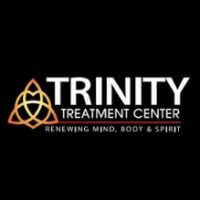

The facility name, logo and brand are the property and registered trademarks of Houston Behavioral Science and Psychiatry, and are being used for identification and informational purposes only. Use of these names, logos and brands shall not imply endorsement. RehabNow.org is not affiliated with or sponsored by Houston Behavioral Science and Psychiatry.

